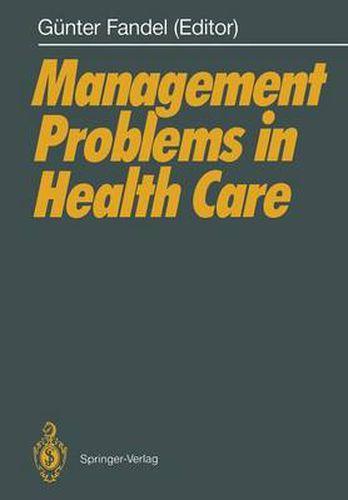Readings Newsletter
Become a Readings Member to make your shopping experience even easier.
Sign in or sign up for free!
You’re not far away from qualifying for FREE standard shipping within Australia
You’ve qualified for FREE standard shipping within Australia
The cart is loading…






This title is printed to order. This book may have been self-published. If so, we cannot guarantee the quality of the content. In the main most books will have gone through the editing process however some may not. We therefore suggest that you be aware of this before ordering this book. If in doubt check either the author or publisher’s details as we are unable to accept any returns unless they are faulty. Please contact us if you have any questions.
The treatment and the solution of health economic problems by using management concepts is a permanent challenge; the question of control ling the costs or the efficiency of the supply of medical services is concerned. The articles in this book hope to make a concrete contri bution to this subject by reporting on the latest research the authors have made in this area. The medical services involved can either be part of the general provi sion of medical care and treatment to the population or can be provided by hospitals which are complex systems of public health care. The divi sion of the contents of this book reflects this distinction. The four articles in Part A are concerned with problems of general health care. Part B is dedicated to particular problems relating to hospital planning and contains five articles. In Part A the first article by Heidenberger deals with ‘Optimal Resource Allocation in Horizontally and Vertically Disaggregated Health Programs’ Using corresponding model formulations and linear programming the pro blem is solved of how a fixed budget should be distributed among the measures of a social health program so that the control of an illness is as effective as possible. In the case in question the illness to be controlled is high blood pressure. The possibilities for using this type of approach in health programs to combat other illnesses are ob vious.
$9.00 standard shipping within Australia
FREE standard shipping within Australia for orders over $100.00
Express & International shipping calculated at checkout
This title is printed to order. This book may have been self-published. If so, we cannot guarantee the quality of the content. In the main most books will have gone through the editing process however some may not. We therefore suggest that you be aware of this before ordering this book. If in doubt check either the author or publisher’s details as we are unable to accept any returns unless they are faulty. Please contact us if you have any questions.
The treatment and the solution of health economic problems by using management concepts is a permanent challenge; the question of control ling the costs or the efficiency of the supply of medical services is concerned. The articles in this book hope to make a concrete contri bution to this subject by reporting on the latest research the authors have made in this area. The medical services involved can either be part of the general provi sion of medical care and treatment to the population or can be provided by hospitals which are complex systems of public health care. The divi sion of the contents of this book reflects this distinction. The four articles in Part A are concerned with problems of general health care. Part B is dedicated to particular problems relating to hospital planning and contains five articles. In Part A the first article by Heidenberger deals with ‘Optimal Resource Allocation in Horizontally and Vertically Disaggregated Health Programs’ Using corresponding model formulations and linear programming the pro blem is solved of how a fixed budget should be distributed among the measures of a social health program so that the control of an illness is as effective as possible. In the case in question the illness to be controlled is high blood pressure. The possibilities for using this type of approach in health programs to combat other illnesses are ob vious.